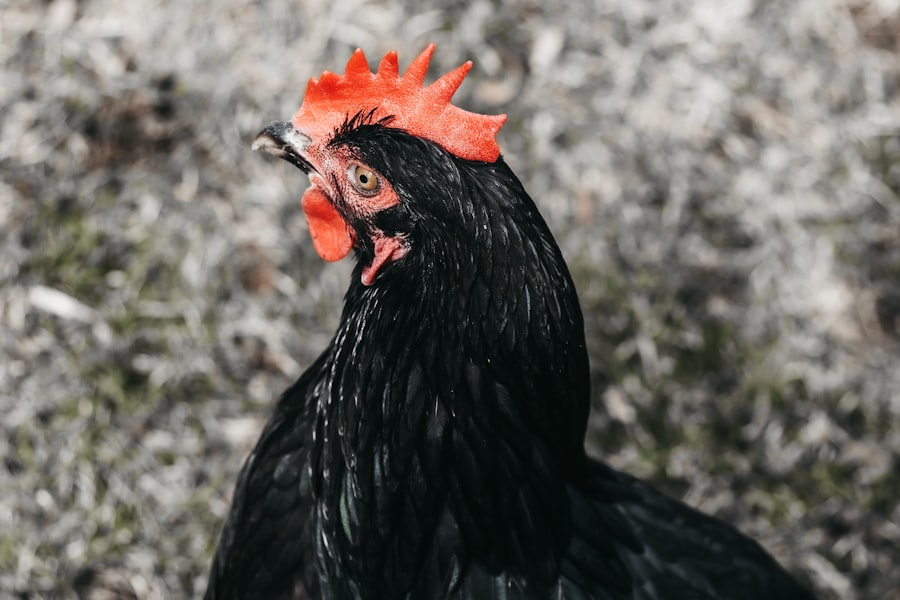Keeping chickens offers numerous advantages. Primarily, they provide a reliable source of fresh, nutritious eggs free from artificial additives when raised under controlled conditions. For those interested, chickens can also serve as a source of meat.
Chickens contribute to natural pest control by consuming insects and other small garden pests. Their droppings serve as an excellent organic fertilizer, rich in essential nutrients like nitrogen, phosphorus, and potassium, which promote healthy plant growth. Beyond practical benefits, chicken-keeping can be a rewarding hobby.
Many individuals find interacting with chickens to be relaxing and therapeutic. The unique personalities and behaviors of chickens often provide entertainment and companionship. In summary, keeping chickens offers a combination of practical, environmental, and personal benefits, making them a valuable addition to many households and properties.
Table of Contents
Key Takeaways
- Keeping chickens can provide a sustainable source of fresh eggs and natural pest control in your backyard.
- Local regulations and zoning laws may restrict the number of chickens you can keep and the type of coop you can have.
- Health and safety considerations include proper sanitation, disease prevention, and protection from predators.
- Proper care and maintenance of chickens involves providing adequate shelter, food, water, and regular health check-ups.
- Potential costs and investments include purchasing or building a coop, feed, bedding, and veterinary care for the chickens.
- Resources for obtaining a license may include contacting local government offices or agricultural extension services for information and applications.
- Whether a license is necessary for keeping chickens depends on local regulations and the number of chickens you plan to keep.
Local Regulations and Zoning Laws
Understanding Local Ordinances
Many cities and towns have specific ordinances regarding the keeping of livestock, including chickens. These regulations may dictate the number of chickens allowed per property, the distance they must be kept from neighboring properties, and the type of coop or enclosure required.
Zoning Laws and Coop Location
Zoning laws may also impact the location of your chicken coop. Some areas have specific zoning requirements for agricultural structures, which may affect where you can place your coop on your property. It is crucial to familiarize yourself with these regulations to ensure that you are in compliance with local laws.
Obtaining a License and Avoiding Consequences
Failure to comply with local regulations could result in fines or other legal consequences. In some cases, obtaining a special permit or license may be necessary to keep chickens legally. This process may involve submitting an application, paying a fee, and meeting certain criteria set forth by local authorities. It is vital to thoroughly research the requirements for obtaining a license in your area to ensure that you are in compliance with all necessary regulations.
Health and Safety Considerations

When keeping chickens, it is important to prioritize their health and safety. This includes providing them with a clean and secure living environment, regular access to fresh water and food, and proper veterinary care when needed. Additionally, it is important to protect your chickens from predators such as foxes, raccoons, and birds of prey by ensuring that their coop is secure and predator-proof.
Another important consideration is disease prevention. Chickens can be susceptible to various illnesses and parasites, so it is important to monitor their health regularly and take preventative measures to keep them healthy. This may include regular cleaning of their coop, providing them with a balanced diet, and administering vaccinations or medications as recommended by a veterinarian.
It is also important to consider the potential impact of keeping chickens on human health. Proper hygiene practices should be followed when handling chickens or their eggs to reduce the risk of foodborne illness. This includes washing hands thoroughly after handling chickens or their eggs and properly cooking eggs before consuming them.
Overall, prioritizing the health and safety of your chickens is essential for their well-being and for the well-being of those around them.
The Importance of Proper Care and Maintenance
Proper care and maintenance are essential for keeping chickens healthy and happy. This includes providing them with a clean and comfortable living environment, regular access to food and water, and proper veterinary care when needed. Additionally, it is important to monitor their health regularly and take preventative measures to keep them healthy.
Regular cleaning of the chicken coop is essential for maintaining a healthy living environment for your chickens. This includes removing droppings, replacing bedding, and disinfecting surfaces as needed. Providing your chickens with a balanced diet that meets their nutritional needs is also important for their overall health and well-being.
In addition to physical care, it is important to consider the mental well-being of your chickens. Providing them with opportunities for exercise and mental stimulation can help prevent boredom and reduce stress. This may include providing them with space to roam outside of their coop, as well as toys or other enrichment activities.
Overall, proper care and maintenance are essential for keeping chickens healthy and happy. By prioritizing their well-being, you can ensure that they live long and fulfilling lives.
Potential Costs and Investments
Keeping chickens can come with various costs and investments that should be considered before getting started. The initial investment may include purchasing or building a chicken coop, purchasing feeders and waterers, and acquiring the necessary supplies such as bedding and feed. Additionally, ongoing costs may include purchasing feed, bedding, and other supplies on a regular basis.
It is also important to consider the potential costs associated with veterinary care for your chickens. This may include routine check-ups, vaccinations, medications, or emergency care in the event of illness or injury. It is important to budget for these potential expenses to ensure that you can provide proper care for your chickens when needed.
In addition to financial costs, keeping chickens also requires a significant time investment. This includes daily tasks such as feeding and watering your chickens, collecting eggs, cleaning the coop, and monitoring their health. It is important to consider whether you have the time available to dedicate to caring for chickens before getting started.
Overall, keeping chickens can come with various costs and investments that should be carefully considered before getting started. By planning ahead and budgeting for these expenses, you can ensure that you are prepared to provide proper care for your chickens.
Resources for Obtaining a License

Local Resources
Start by checking your local government website or agricultural department for information on the specific requirements for obtaining a license in your area. They can provide details on the application process, required documentation, fees, and any additional criteria that must be met.
Online Resources
In addition to local resources, you can also find online resources that offer guidance on obtaining a license for keeping chickens. Websites and forums dedicated to backyard chicken keeping are a great place to start, as they often feature individuals sharing their experiences and advice on navigating the licensing process.
Local Chicken Keeping Groups
Reaching out to local chicken keeping groups or organizations in your area can also be incredibly helpful. These groups often have valuable insights into the specific requirements in your area and can provide support as you navigate the process. By utilizing these resources, you can ensure that you’re well-informed and prepared to meet all necessary requirements.
Is a License Necessary?
In conclusion, whether or not a license is necessary for keeping chickens depends on the specific regulations and zoning laws in your area. It is important to thoroughly research the requirements in your area before getting started to ensure that you are in compliance with all necessary regulations. Regardless of whether a license is required, it is important to prioritize the health and safety of your chickens by providing them with proper care and maintenance.
This includes providing them with a clean and secure living environment, regular access to food and water, proper veterinary care when needed, and protection from predators. Ultimately, keeping chickens can be a rewarding experience that provides numerous benefits such as fresh eggs, pest control, natural fertilizer, and enjoyment. By understanding the local regulations and zoning laws in your area and prioritizing the well-being of your chickens, you can ensure that you are well-prepared to keep chickens responsibly and legally.
If you’re considering keeping chickens, you may be wondering if you need a license to do so. According to a recent article on PoultryWizard, it’s important to check with your local government to see if a license is required for keeping chickens. The article also provides helpful tips on choosing the right chicken coop, such as the SnapLock Chicken Coop and the Chicken Coop in Chester, SC. Additionally, if you’re interested in keeping ducks, the article also offers advice on what to feed them. Read more here.
FAQs
Do you need a license to keep chickens?
No, in many areas, you do not need a license to keep chickens on your property. However, there may be local regulations or zoning laws that you need to adhere to.
What are the regulations for keeping chickens?
Regulations for keeping chickens vary by location. Some common regulations include limits on the number of chickens you can keep, requirements for coop size and cleanliness, and restrictions on roosters due to noise concerns.
Do I need to notify my neighbors if I want to keep chickens?
It is a good idea to notify your neighbors if you plan to keep chickens, especially if there are any local regulations or restrictions in place. This can help prevent any potential conflicts or misunderstandings.
Are there any health or safety concerns with keeping chickens?
There are potential health and safety concerns with keeping chickens, such as the risk of disease transmission and the need to properly handle and dispose of chicken waste. It is important to educate yourself on proper chicken care and hygiene practices.
Can I keep chickens in a residential area?
In many residential areas, it is possible to keep chickens, but you will need to check local regulations and zoning laws to ensure compliance. Some areas may have restrictions on keeping livestock in residential zones.
Meet Walter, the feathered-friend fanatic of Florida! Nestled in the sunshine state, Walter struts through life with his feathered companions, clucking his way to happiness. With a coop that’s fancier than a five-star hotel, he’s the Don Juan of the chicken world. When he’s not teaching his hens to do the cha-cha, you’ll find him in a heated debate with his prized rooster, Sir Clucks-a-Lot. Walter’s poultry passion is no yolk; he’s the sunny-side-up guy you never knew you needed in your flock of friends!







